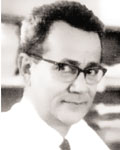
Faces & TracesAli Mohammed Luqman, a Yemeni pioneer in romantic poetry and poetic drama [Archives:2008/1124/Culture]
January 28 2008
 |
Faces & Traces is a cultural series of concise biographies of local or international famous and obscure personalities in fields such as literature, arts, culture and religion in which these individuals contribute affirmatively. It is a short journey in contemporary history, attempting to tackle numerous effective characters in human civilization.
Ali Mohammed Luqman was a Yemeni poet, playwright, journalist and politician. Born in Aden in 1918, Luqman was raised in an open cultural environment by his father, a pioneer in Aden's enlightenment movement during his generation.
Luqman received his primary and secondary education in Aden before traveling to study at the Islamic University in India in 1934. Moving to Egypt in 1944, he enrolled in Cairo's American University, from which he graduated with honors with a bachelor's in journalism.
Upon returning to Aden, Luqman was editor-in-chief of Fatat Al-Jazeera (The Arabian Peninsula's Girl) newspaper established by his father in January 1940. In April 1949 , the General Assembly political bloc formed in Aden, with Luqman elected its secretary-general in June 1944.
Luqman contributed positively to this period's political activities, being appointed president of Aden's Cultural Council following the end of World War II in 1945.
In 1952, Luqman established and was editor-in-chief of the weekly Al-Qalam Al-Adeni (The Adeni Pen) newspaper, the General Assembly's official newspaper, and adopted the unique idea of Yemeni unity.
Still during British colonization, Luqman became a member of Aden's Constitutional Council in 1959, while at the same time continuing his journalistic endeavors in Aden by founding and heading up a daily newspaper called Al-Akhbar (The News) in 1964.
South Yemen gained independence on Nov. 30, 1967, thus ending 128 years of British rule, as well as the period of political disagreements between various national authorities in Aden. Following the National Liberation Front's emergence as an absolute dominant power in Aden, thousands of nationalists were displaced to North Yemen, including Luqman, who resettled in Taiz in 1972, working in a store.
Besides being a pioneer in and a reviver of romantic poetry, Luqman is considered a prominent figure in Yemeni literature, journalism and politics. He's one of the great figures occupying first place in Aden cultural life between 1946 and 1966.
Attempting his first poetry at age 16, Luqman's diverse literary works include divans, poetic dramas, critiques and journalistic pieces. He published some of his early poems in Fatat Al-Jazeera newspaper and eventually penned eight poetic divans, including one in the Adeni dialect.
Luqman's first divan, 1944's “Al-Watar Al-Maghmoor” (The Obscure String), was the first poetic divan published in Aden. In it, he renewed the structure of classical poetry by employing three different poetic meters in a single poem and by changing the rhythm within the same poem.
His second divan was 1945's “Sorrows in the Night,” followed by “Moans of a Nation” in 1961, which included numerous social concerns and political attitudes associated with pre-revolutionary poetry. Luqman issued the divan, “Hadeer Al-Qafilah” (Caravan's Roaring), in June 1965, therein poetically expressing his viewpoint on various causes such as Palestine and Arab nationalism.
“The Seven Routes” (1969) studied Arab peoples' happiness and sadness, such as gaining political independence from their colonizers. Among his other divans are “Stranger's Nights” (1965) and “Al-Warrad” (Goods and Water Supplier), which was written in the Adeni dialect.
In the field of dramatic literature, Luqman is considered a pioneer in Yemeni poetic drama with his seven poetic dramas. He began writing one-act plays and publishing them in Fatat Al-Jazeera newspaper in 1941.
His first poetic drama was 1943's “Pygmalion,” which was performed onstage at the British Institute Hall in Aden. Depicting a Cypriot sculptor of the same name and derived from Roman mythology, the play later was published in 1948.
“The Lost Justice” (1956) was a social and romantic poetic drama by Luqman looking at human relationships between man and woman and mother and child. Among his other romantic dramas was “Qais and Layla,” published in August 1957, portraying the conflict between the old and new aspects of social life through the romantic relationship between the two protagonists and the various obstacles they encounter.
The 1966 historical drama, “The Arabs' Brunette,” depicted the life of Zenobia, the Syrian Queen of Palmyra who flourished in the third century A.D., and her struggle against the Romans. It was filled with lines depicting the nationalist attitudes of Yemenis against British occupation.
Luqman's other dramas include “The Desired Shadow” and “Adonis or Peace on Earth.”
In the field of political writings and critique, Luqman issued a 1949 book entitled, “Autonomy or Adenis' Sufferings and Expectations,” which included social and political essays about situations in Aden. Additionally, he penned another book, “The Victory of Intellect,” published by Aden's Cultural Council, in addition to an essay in English about Fatat Al-Jazeera newspaper.
Luqman died Dec. 24, 1978 while receiving medical treatment in the United States and was buried in Sana'a. His intellectual maturity helped him become an excellent and a rightful researcher. While free of self-conceit, no one could dispute his cognitive richness and his rapid comprehension.
——
[archive-e:1124-v:15-y:2008-d:2008-01-28-p:culture]


